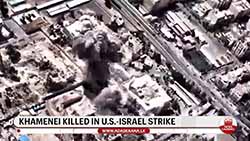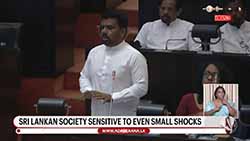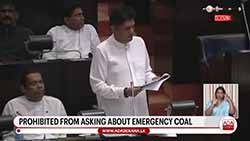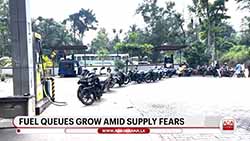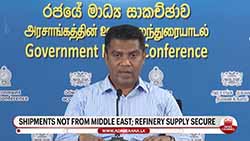MR urges govt not to jeopardize national security over petty politics
December 4, 2015 06:43 pm
Former President Mahinda Rajapaksa today accused the government of “hastily” releasing “hard core terrorists” without regard to the nation’s security due to political pressure from certain interested quarters.
The Kurunegala District UPFA MP was delivering a speech in Parliament for the first time since being elected at the General Election in August.
He stated that after the LTTE was defeated in 2009 there were about four attempts of varying severity by separatist terrorists to regroup in the North but due to the “vigilance” of his government they were able to “nip all those attempts in the bud.”
“I see now that this vigilance no longer exists,” he declared.
My government rehabilitated and released over 11,000 LTTE cadres and retained in custody only those considered to be dangerous to the community, he said.
“The present government has been hastily releasing hard core terrorists without regard to the nation’s security due to political pressure from certain interested quarters.”
“While dangerous LTTE detainees are being released, the Prevention of Terrorism Act is being used to imprison members of the military,” he charged.
He stressed that the PTA was enacted to deal with terrorism and not to detain members of the armed forces.
Rajapaksa also slammed the current administration’s “ill-conceived” foreign policy, which he claims is based on “bending over backwards” to please certain foreign governments which are in turn influenced in their policy towards Sri Lanka by various Tamil Diaspora organisations which can deliver votes at elections in those countries.
The ex-President called upon the government not to place the nation’s security in jeopardy over “petty political considerations” and due to their “antipathy” towards him and the government he led.
Full Speech:
Hon. Speaker,
In 2009, we militarily defeated the LTTE which had been officially named by the US Federal Bureau of investigation as the deadliest terrorist organisation in the world. Though we had defeated the military machine of the LTTE, their political and financial structures based in Western countries remained intact. Therefore, my government maintained constant vigilance to ensure that there was no resurgence of terrorism in Sri Lanka. There were about four attempts of varying severity by separatist terrorists to regroup in the North but due to our vigilance my government was able to nip all those attempts in the bud.
I see now that this vigilance no longer exists. My government rehabilitated and released over 11,000 LTTE cadres and retained in custody only those considered to be dangerous to the community. The present government has been hastily releasing hard core terrorists without regard to the nation’s security due to political pressure from certain interested quarters.
While dangerous LTTE detainees are being released, the Prevention of Terrorism Act is being used to imprison members of the military. The PTA was enacted to deal with terrorism, not to detain members of the armed forces. If any investigation is to be carried out into the conduct of military personnel, the government has a duty to deal with the issue under the laws applicable to the military or under the ordinary law of the country. That is a basic curtsy that we have to extend to members of the armed forces who sacrificed so much for the country. We have to be heedful of the self respect of our armed forces.
Officials of foreign organisations have been permitted unfettered access to Sri Lanka’s military installations such as the Naval base in Trincomalee. This has resulted in an immediate danger posed to members of the intelligence wing of the Navy reminiscent of the situation that arose after the Milenenium city betrayal in 2002.
Hon Speaker,
We have to be mindful of the events which occurred on the so called Mahavir day marked recently. The black flags and the posters on the Jaffna campus openly deified Prabhakaran and called for the establishment of Eelam. The provincial council of the Northern Province ordered that schools be closed and hartals and hunger strikes were organised in the North to bring pressure to bear on the government to release dangerous terrorists. A 17 year old youth jumped in front of a moving train and committed suicide. It is said that a letter was found in his possession demanding that LTTE prisoners be released forthwith. It is not possible to believe that a teenager would have resorted to this behaviour without instigation and elaborate planning by others. We must be mindful of where these incidents are leading the country.
Despite the danger signs that have been manifesting themselves, the government has taken the ill-advised move of removing the proscriptions on eight pro-LTTE organisations and 269 individuals. I have seen on the internet photographs of the Tamil Youth Organisation and the Canadian Tamil Congress both of which were recently de-proscribed, hoisting the Eelam flag and paying public homage to Prabhakaran. These are organisations which my government banned to safeguard Sri Lanka’s security but they have all been irresponsibly de-proscribed by the current administration.
Officials of foreign governments have visited our country and made demarches to Sri Lanka’s leadership about withdrawing the military from the Northern province. Decisions with regard to the deployment of troops are matters that should solely be within the sovereign jurisdiction of Sri Lanka. I cannot approve of officials of foreign governments declaring that they will remain ‘cautious and vigilant’ with regard to military matters in Sri Lanka.
The root cause of these problems is the ill-conceived foreign policy of the current administration which is based on bending over backwards to please certain foreign governments which are in turn influenced in their policy towards Sri Lanka by various Tamil Diaspora organisations which can deliver votes at elections in those countries.
Hon Speaker,
In October this year, the present government ill-advisedly accepted and co-sponsored a resolution against Sri Lanka which is based on a report which states that there are ‘reasonable grounds to believe’ that Sri Lanka’s armed forces committed grave crimes during the last phase of the war against the LTTE.
In terms of this resolution the government has agreed to establish a war crimes court to try Sri Lankan military personnel with the participation of foreign judges, prosecutors and investigators and to allow this mechanism to obtain funding from foreign countries. They have also agreed to reform the domestic law to bring it into line with the laws implemented by international war crimes tribunals. They have also undertaken to remove through an administrative process members of the military suspected of having committed human rights abuses even if there is insufficient evidence to charge them in a court of law.
When the British prime minister met our President recently, the former made an offer of six million pounds to reform the military. I do not believe that foreign governments should be sponsoring the reform of Sri Lanka’s armed forces nor should any such reform be done due to pressure from overseas.
I have come to learn that the senior military officers who led the various Divisions during the final phase of the war are to be retired without being given the usual service extensions. When these officers retire, they lose the institutional backing and protection provided by the military. Sending these officers on retirement at a time when war crimes investigations are being spoken of is a clear case of deliberately abandoning these officers. It is my view that these officers should be granted service extensions by the government until the danger abates.
The government has also agreed amend the Public Security Ordinance and to repeal the Prevention of Terrorism Act and replace it with legislation acceptable to the foreign powers. I see this as a reckless dismantling of the country’s core security legislation.
Hon. Speaker,
The State owned Rakana Lanka Security Service built up a successful maritime security service in the Indian ocean region during my administration. More than twenty private security companies collaborated with Rakna Lanka in this enterprise in various capacities. Sri Lanka earned a considerable amount of foreign exchange through this endeavour and it continued to function under the present government until very recently. But now I find that the government has for political reasons embarked on a course of action aimed at completely destroying this successful maritime security service which functioned with the approval of the relevant UN bodies.
Key individuals who provided political and military leadership to the war effort are now being hauled virtually on a daily basis before various police financial investigation units and commissions of inquiry probing allegations corruption and fraud. I believe this is being done to tarnish the image that these individuals built up in the country by providing leadership to the war effort. I know that the people are following these developments carefully.
I wish to call upon the government to not to place the nation’s security in jeopardy over petty political considerations and due to their antipathy towards me and the government I led.
Thank you.





